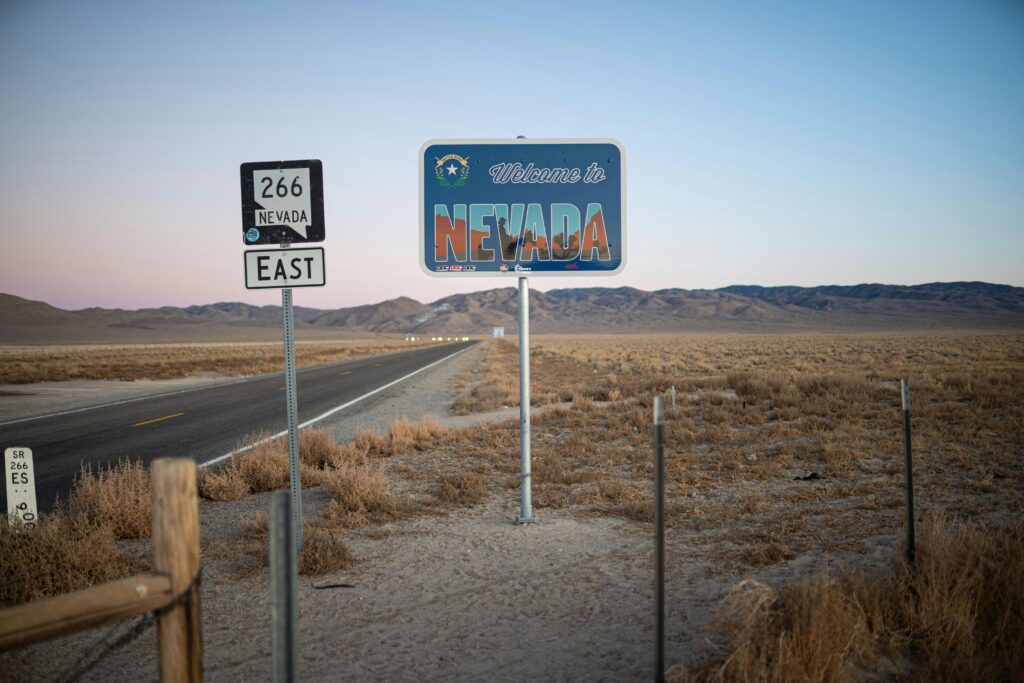Nevada Gun Laws, Explained [2025 Update]

Nevada gun owners and those interested in purchasing firearms must understand the state’s laws regulating the sale, possession, and use of guns and ammunition. While Nevada is considered a relatively gun-friendly state, it still has several important restrictions in place.
Background Checks for Private Party Transfers
In 2019, Nevada enacted a universal background check law requiring private party gun sales and transfers to be conducted through a federally licensed firearms dealer.
The dealer must run a background check on the buyer through the FBI’s National Instant Criminal Background Check System (NICS) before completing the transaction. (SB 143 (2019)).
However, there are some exceptions to this requirement, including transfers between immediate family members, executors administering an estate that includes a firearm, and temporary transfers at shooting ranges or while hunting. (NRS 202.2544-202.2549).
Who Is Prohibited From Possessing Firearms?
Under Nevada law, the following persons are prohibited from owning, possessing, or having custody or control of a firearm:
- Those convicted of a felony (unless civil rights have been restored)
- Fugitives from justice
- Unlawful users or addicts of any controlled substance
- People adjudicated mentally ill or committed to a mental institution
- Illegal aliens
- Persons dishonorably discharged from the Armed Forces
- Those convicted of a misdemeanor crime of domestic violence
- People subject to an extended protection order for domestic violence or stalking (NRS 202.360).
Knowingly selling or transferring a firearm to a prohibited person is a category B felony, punishable by 1-6 years in prison and possibly a fine of up to $5,000. (NRS 202.362).
Open Carry and Concealed Carry Laws
Nevada allows the open carry of firearms in public without a permit, including on foot and in vehicles, for anyone at least 18 years old and not otherwise prohibited from possessing guns. However, municipal governments can enact local laws restricting open carry within their jurisdiction on public property like parks, city buildings, and schools.
It’s also banned in certain locations under state law, such as:
- On school property, college campuses, or childcare facilities (unless a permittee) (NRS 202.265)
- In legislative buildings (NRS 218A.905)
- In a secured area of an airport (NRS 202.3673)
- On private property where the owner has posted a “no guns” sign (NRS 202.3673)
To carry a concealed firearm, one must obtain a Nevada Concealed Carry Weapon (CCW) permit from their local county sheriff. Applicants must be at least 21, complete an approved training course, pass an extensive background check, and not belong to any prohibited categories. (NRS 202.3657). Nevada recognizes CCW permits from certain other states.
Nevada CCW Reciprocity With Other States
Nevada recognizes concealed carry permits from the following states: Alaska, Arizona, Arkansas, Florida, Idaho (enhanced permits only), Illinois, Kansas, Kentucky, Louisiana, Massachusetts, Michigan, Minnesota, Mississippi (enhanced permits only), Montana, Nebraska, New Mexico, North Carolina, North Dakota, Ohio, Oklahoma, South Carolina, South Dakota (enhanced permits only), Tennessee, Texas, Utah, Virginia, West Virginia, Wisconsin, and Wyoming.
The minimum age for reciprocity is 21. Nevada residents must have a Nevada permit to concealed carry in the state. The full reciprocity list is maintained on Nevada’s Department of Public Safety website.
These states currently honor Nevada concealed carry permits: Alabama, Arkansas, Idaho, Indiana, Montana, New Hampshire, North Carolina, North Dakota, South Dakota, and Vermont. Many of these have permitless “constitutional carry” laws, but certain age restrictions may apply. Always check each state’s current laws before traveling with firearms.
Castle Doctrine and Stand Your Ground
Nevada’s “castle doctrine” law presumes you acted in reasonable fear of imminent death or bodily injury if you used deadly force against someone who was forcibly entering or had entered your occupied habitation or vehicle. The presumption does not apply if the person had a right to be in the home/vehicle or was a law enforcement officer acting in their official capacity. (NRS 200.120).
Outside the home, Nevada is a “stand your ground” state. There is no duty to retreat before using lethal force if you are not the original aggressor, have a right to be present at the location, and are not actively engaged in criminal activity at the time. Lethal force is justified when you reasonably believe it necessary to prevent imminent death, great bodily harm, a sexual assault, or the commission of a felony. (NRS 200.120).
Prohibited Arms and Accessories
Nevada prohibits machine guns, silencers, short-barreled rifles, and shotguns (unless federally registered pre-1986), rifles under 16″ long, shotguns under 18″ long, firearms with defaced serial numbers, and armor-piercing ammunition. Manufacture, importation, sale, or possession of such weapons is a category D felony. Semi-automatic firearms and magazines of any capacity are not banned. (NRS 202.275, 202.350, 202.360).
Consult an Experienced Nevada Gun Crimes Attorney
If you’ve been charged with violating Nevada’s gun laws, the penalties can be severe, including heavy fines and lengthy prison sentences. You need an experienced weapons defense lawyer on your side to protect your rights and build the strongest possible case for acquittal or reduced charges.
At the Benjamin Durham Law Firm, our skilled criminal defense attorneys have a track record of successfully defending clients against Nevada firearms and weapons charges. We will carefully review the evidence, identify any potential defenses, and work tirelessly to secure the best outcome.
Don’t delay seeking legal representation if you’re facing gun charges. Contact our office today for a confidential consultation. Let our experience work for you.
Disclaimer: This blog post is for general informational purposes only and does not constitute legal advice. If you are accused of a crime, please consult with a licensed attorney in your area.



